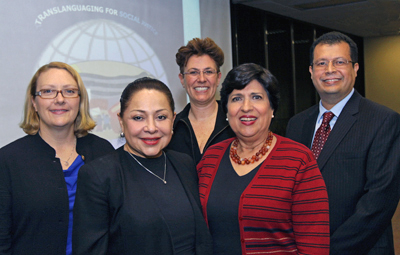By Daniel Perez
UTEP News Service
A five-year effort to improve and expand the knowledge and skills of teachers who work with English Language Learners has started at The University of Texas at El Paso, and the hope is that the information gathered through this program will transform ELL instruction throughout the country.
UTEP researchers Elena Izquierdo, Ph.D., and Char Ullman, Ph.D., are co-principal investigators of Project LEAD (Leadership in English Acquisition, Academic Achievement, and Development), funded by a $1.8 million National Professional Development grant from the U.S. Department of Education.
The two associate professors of teacher education and their team of doctoral students will use the study of cultures to understand the impact on ELL students and the pedagogy of “translanguaging,” which is a new form of multilingualism that defies traditional ideas of separate languages. Among the other initial studies will be the influence of Spanish language parents on the academic process and how the spontaneous use of different languages in real conversations can impact and improve teaching and learning.
The program has partnered with Socorro High School in El Paso’s Lower Valley and its feeder schools. The initial cohort of 70 graduate students from throughout the feeder system started last month at the high school, the program’s secondary ELL professional development site.
“This is a very exciting project,” said Ullman, who wants to create an educational environment that builds on children’s language resources so that they can become engaged multilingual/multicultural citizens. “We’re thrilled with the interest in it and hope it will generate a lot of great research.”
Among the project’s other objectives are to establish a regional clearinghouse for its student-generated ELL research and improve the University’s interdisciplinary teacher preparation program to support ELL achievement. The grant also will pay for teachers to earn English as a Second Language certifications and to become mentors. It also will support administrators who promote ELL education.
“We will be a model for the state, and ultimately for the nation,” Izquierdo said. “Our University is well positioned as a borderland research laboratory with an expertise in language and languaging,” or communicating and using language with all its integral components.
Socorro High School Principal Miguel Serrano, Ph.D., welcomed the opportunity to participate in this research. The former ESL teacher and longtime bilingual education advocate said about 11 percent of his 2,604 students are English Language Learners, and 90 percent of the student body is made up of native Spanish speakers.
“(The students) have to learn to use their native tongue as a bridge to learn a second language,” said Serrano, the first person to earn a UTEP doctorate in Teaching, Learning and Culture in May 2012.
He sees the partnership as a win-win where students will benefit from the training teachers will receive while earning an English as a Second Language certification. Of the 70 teachers involved, 10 are from his high school.
“It is an honor that Socorro High School and the Socorro Independent School District are partners in this opportunity to improve the lives of (ELLs),” he said.
Vanessa Espitia-Mendoza is a UTEP doctoral student who plans to investigate the challenges faced by parents of ELL students who are part of the Socorro High School feeder system. She is building a network of contacts that she will use when her research begins this fall.
The Mexican native came up with her research angle of parental involvement policies versus practices last year after she had conducted some focus groups of parents of students enrolled in Izquierdo’s fall 2011 Literacy Camps, which help elementary and middle school ELL students. Espitia-Mendoza learned that many parents had no or limited knowledge of their parental rights or what their children were learning in school. She said numerous studies have shown the importance of parental involvement in student achievement, especially among ELL students.
“Parents want and need to be seen as partners in their child’s education,” she said, adding that many feel lost and frustrated, unwelcome and distrusted. “They want to share responsibility.”
Espitia-Mendoza said she ultimately hopes to learn enough to offer policy suggestions that will encourage parental support.
The doctoral student was among the approximately 180 people who attended the Project LEAD kickoff conference Jan. 24-25 at UTEP’s Tomás Rivera Conference Center. The crowd consisted of representatives from area school districts, community agencies and UTEP students, faculty and staff. One of the keynote speakers was Ofelia Garcia, Ph.D., professor of Hispanic and Luso-Brazilian literatures and languages at the City University of New York.
Garcia said Project LEAD can make people understand that bilingualism is a resource and not a problem. She said teachers need to understand that concept, and use it effectively so students can learn more, understand more and meet academic standards in English.
“I think the work that universities do in the schools is extremely important,” she said. “In many ways it is the most important because it not only stays in one’s head but is communicated so some social action takes place. I’m happy (Ullman and Izquierdo) were able to get the grant and that they are launching this effort. It will be very important for the future.”
